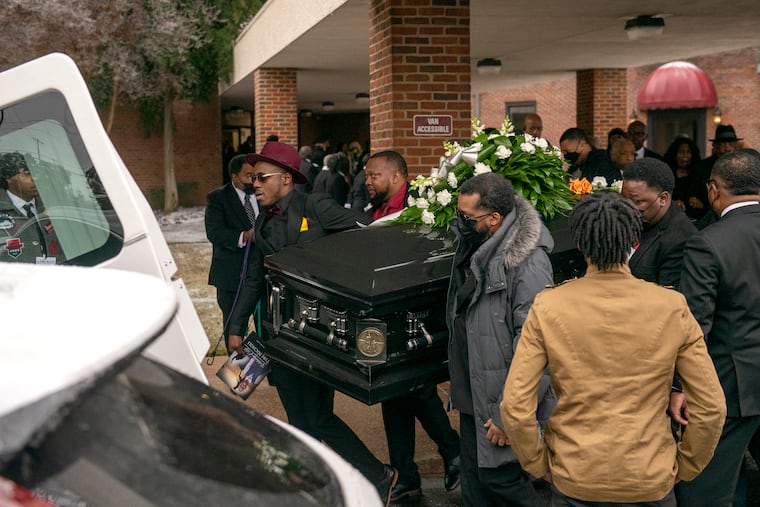A month to celebrate Black history begins with mourning the loss of another Black man at the hands of police
When it comes to police reform, we must make sure that what we do matches what we say

The scenes from the funeral at the Mississippi Boulevard Christian Church in Memphis on Wednesday were achingly familiar: a soaring choir, anguished friends and family, speakers describing the all-too-brief life of yet another Black man who died at the hands of police.
This time, it was five Black officers who rained blow after blow upon Tyre Nichols while he lay on the ground crying out for his mother.
There is a fellowship of these families now, I noted as I watched the service. In attendance were family members of George Floyd, Breonna Taylor, Botham Jean, and Eric Garner — each of them a representative of those killed by police, and each of them watching their ranks grow in number.
Meanwhile, as a live broadcast of Nichols’ funeral played out on TV, there was the near-constant ping of emails from companies and brands from the laptop and phone in front of me. Happy! Black! History! Month!
And it wasn’t just emails, either. There were tweets, Instagram posts, Facebook ads. All of these corporations, so eager to show how much they appreciate Black and brown people.
And yet, if you weren’t paying attention, you might have missed what happened on the very same day, when — under pressure from Ron DeSantis, the Sunshine State’s governor, recent Center City tourist, and potential presidential candidate — the College Board announced that it was going to do like Florida and start erasing actual Black history.
Gone was Critical Race Theory and Black feminism and Black Lives Matter and the queer experience from an Advanced Placement course in African American studies.
New to the curriculum? Black conservatism, in case anyone ever believed that fascists like DeSantis were sincere about trying to strip courses of all kinds of political agenda and ideological material.
Among the authors purged were many who have shaped our understanding of race, class, and feminism, including Columbia University law professor Kimberlé W. Crenshaw, Yale University professor Roderick Ferguson, and the writers Ta-Nehisi Coates and bell hooks.
It was hooks, who died in 2021, who once said:
“What we do is more important than what we say or what we say we believe.”
It is a simple, yet deceptively profound statement that can easily be applied to how much we talked, and continue to talk, of reckonings in this country since 2020 — and how little has come of any of it.
If that was ever up for debate, it was clear once again while hearing another church full of mourners raising their voices in the name of justice.
It was gut-wrenching to hear Nichols’ mother, RowVaughn Wells, talk about her son: a 29-year-old father who liked skateboarding and photography. He was coming home from taking photos of Tennessee’s January skies when police pulled him over.
But there was another, familiar layer of heartbreak when this mother put her own sorrow on hold at her son’s funeral to urge Congress to pass the George Floyd Justice in Policing Act, a broad package of police reforms.
“We need to take some action because there should be no other child that should suffer the way my son — and all the other parents here have lost their children — we need to get that bill passed,” Wells told mourners. “Because if we don’t, that blood — the next child that dies, that blood is going to be on their hands.”
In that plea was the reverberating echo of the grief of countless other mothers and loved ones who are forced to carry the weight of one of our society’s most egregious failures.
Those mothers include many in our own city, who — in the raw moments after losing their children to acts of gun violence — often beg leaders to do something, anything, to forestall another mother’s pain. In response, though, they receive mostly platitudes and empty promises.
Among the many dignitaries at Nichols’ funeral was Vice President Kamala Harris, who addressed the family:
“You have been extraordinary in terms of your strength, your courage, and your grace,” she told them.
They were nice words, clearly welcome by those in attendance. But what an unfair position these families are placed in time and time again.
To lose a child is agonizing enough, but to lose them at the hands of police and then have to mourn them publicly and adopt a posture where you are expected to show that kind of grace — is both stunning and shameful.
Like other public officials who spoke at the service, Harris demanded action on the George Floyd Act, which she helped author as a senator. President Joe Biden would sign the legislation, she told the crowd.
“We will not be denied,” she said. “It is not negotiable.”
Her words drew applause, even though we should all know by now that being denied of the most basic humanity is an inescapable fact of life for so many Black Americans.
Nichols was denied the right to live. So was Tamir Rice and Freddie Gray and Michael Brown and Philando Castile and countless others whose names we may never know.
This is the self-evident truth: Our country doesn’t value or protect Black and brown lives, and no celebratory month in honor of Black history can hide that.